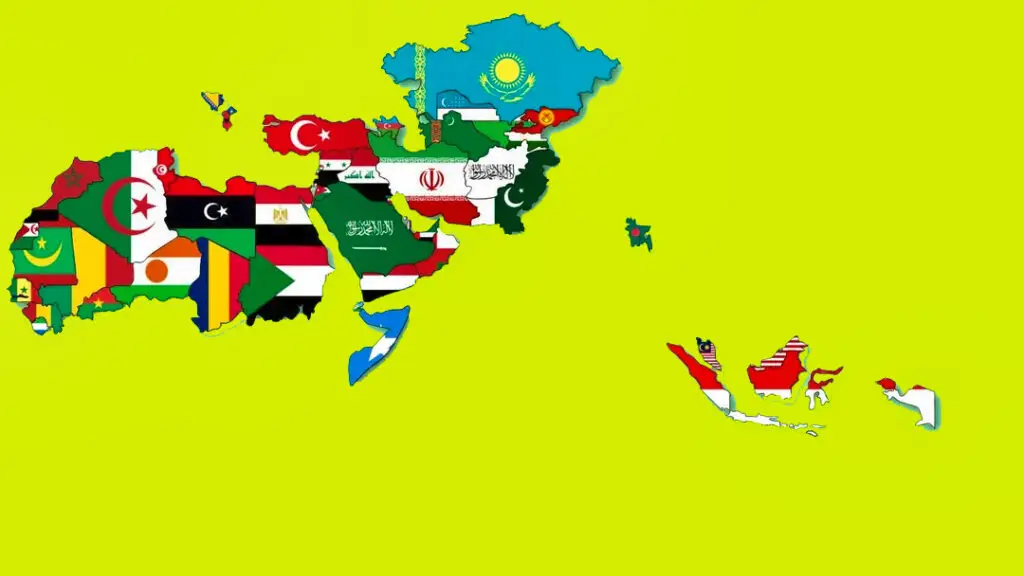In today’s global landscape, Muslim countries play significant roles in international affairs, wielding considerable economic, military, and diplomatic power. This blog post will delve into the world’s most influential Muslim nations, with a special focus on Turkey’s unique position among them.
1. Saudi Arabia: The Petroleum Powerhouse
Saudi Arabia leads the pack with its immense oil wealth and economic influence. It’s not just an economic giant; Saudi Arabia is also a regional military power with modern weapon systems and a formidable air force. As the host of the Hajj pilgrimage, it holds a leadership position among Muslim countries.
2. Indonesia: The Populous Powerhouse
Indonesia, the world’s most populous Muslim country, is a key player in Southeast Asia. With a rapidly developing economy, it’s a major market in Asia and a significant producer in agriculture, mining, and textiles. Indonesia boasts considerable military capacity and plays an active role in regional security and diplomatic forums like ASEAN.
3. Pakistan: The Strategic Stronghold
Pakistan’s strategic location and defense capabilities make it a crucial player in South Asia. It has a growing economy, particularly strong in textiles, agriculture, and energy. As a nuclear power, Pakistan is a regional military actor with a large military inventory and a strong defense force.
4. Egypt: The Historical Heavyweight
Egypt, with its rich history and strategic location, is a vital power center in the Middle East. It’s a major player in regional trade and agriculture and holds a critical position for global maritime transport. Egypt possesses one of the strongest military capacities in the Middle East and is known for its diplomatic influence in the Arab world and Africa.
5. Qatar: The Wealthy Influencer
Qatar, with its vast oil and natural gas reserves, is a global economic powerhouse. It’s investing heavily in modernizing its military and plays a significant role in international diplomacy and aid projects. Qatar also exerts global influence through international media channels like Al Jazeera.
6. Malaysia: The Technological Trailblazer
Malaysia stands out in Southeast Asia for its economic growth and technological advancements. It has a strong economy, particularly in electronics, oil, and natural gas sectors. Malaysia also maintains a robust military capacity with modern military inventory and strategic defense systems.
7. United Arab Emirates: The Investment Innovator
The UAE is notable for its international investments and economic strategies. Beyond its oil and gas reserves, it has significant investments in finance, construction, and technology sectors. Cities like Dubai and Abu Dhabi have become global financial centers.
8. Algeria: The Resource-Rich Contender
Algeria is known for its large oil reserves and regional influence. It also boasts a strong military capacity with modern weapon systems.
9. Sudan: The Agricultural Asset
Sudan possesses rich natural resources and is a significant producer in the agricultural sector. Militarily, it maintains a force comparable to other regional countries.
10. Turkey: The Transcontinental Titan
Turkey, straddling both Asia and Europe, holds a unique strategic position. It’s a G20 country with a rapidly growing economy, particularly strong in industry, technology, and agriculture. Turkey’s domestic automobile production, defense industry investments, and technology development projects are especially noteworthy.
Turkey boasts a powerful military capacity, with the Turkish Armed Forces equipped with a wide range of military assets, including advanced technologies like unmanned aerial vehicles, missile systems, and domestic defense projects. Diplomatically, Turkey is a key player in the Middle East, Caucasus, and Balkans, actively participating in international relations and regional issues.
Conclusion
These ten countries represent the forefront of power and influence among Muslim nations. Each brings unique strengths to the global stage, whether through economic might, military prowess, or diplomatic influence. As the world continues to evolve, these nations will undoubtedly play crucial roles in shaping international affairs and regional dynamics.
